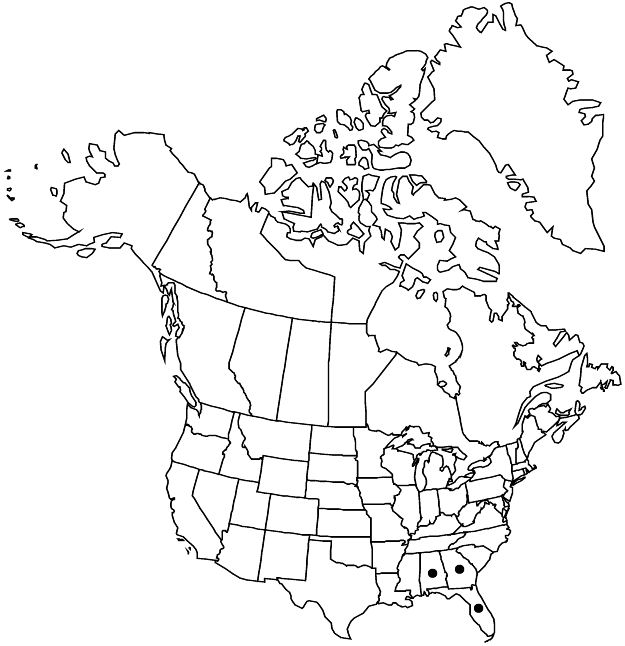Difference between revisions of "Vitis rotundifolia var. munsoniana"
Sida 14: 345. 1991.
FNA>Volume Importer |
FNA>Volume Importer |
||
| Line 19: | Line 19: | ||
|name=Muscadinia munsoniana | |name=Muscadinia munsoniana | ||
|authority=(J. H. Simpson ex Planchon) Small | |authority=(J. H. Simpson ex Planchon) Small | ||
| − | }}{{Treatment/ID/Synonym | + | }} {{Treatment/ID/Synonym |
|name=V. rotundifolia var. pygmaea | |name=V. rotundifolia var. pygmaea | ||
|authority=McFarlin ex D. B. Ward | |authority=McFarlin ex D. B. Ward | ||
| Line 37: | Line 37: | ||
|elevation=0–200 m. | |elevation=0–200 m. | ||
|distribution=Ala.;Fla.;Ga. | |distribution=Ala.;Fla.;Ga. | ||
| − | |discussion=<p>Variety munsoniana is distinguished from the more widespread var. rotundifolia by its smaller and more numerous berries, and these traits remain consistent under greenhouse conditions. It may well represent a species distinct from Vitis rotundifolia.</p><!-- | + | |discussion=<p>Variety munsoniana is distinguished from the more widespread <i></i>var.<i> rotundifolia</i> by its smaller and more numerous berries, and these traits remain consistent under greenhouse conditions. It may well represent a species distinct from <i>Vitis rotundifolia</i>.</p><!-- |
| − | --><p>Variety pygmaea was described based on collections from Polk and Highlands counties, Florida, with shrubby or trailing habit, small leaves, and narrow and ridged seed raphe. Field studies by J. Wen suggest that these characteristics intergrade with those of var. munsoniana and that it is an extreme xeric ecotype of var. munsoniana, which occurs in the same areas.</p> | + | --><p>Variety pygmaea was described based on collections from Polk and Highlands counties, Florida, with shrubby or trailing habit, small leaves, and narrow and ridged seed raphe. Field studies by J. Wen suggest that these characteristics intergrade with those of <i></i>var.<i> munsoniana</i> and that it is an extreme xeric ecotype of <i></i>var.<i> munsoniana</i>, which occurs in the same areas.</p> |
|tables= | |tables= | ||
|references= | |references= | ||
| Line 62: | Line 62: | ||
|publication year=1991 | |publication year=1991 | ||
|special status=Endemic | |special status=Endemic | ||
| − | |source xml=https://jpend@bitbucket.org/aafc-mbb/fna-data-curation.git/src/ | + | |source xml=https://jpend@bitbucket.org/aafc-mbb/fna-data-curation.git/src/8f726806613d60c220dc4493de13607dd3150896/coarse_grained_fna_xml/V12/V12_796.xml |
|genus=Vitis | |genus=Vitis | ||
|subgenus=Vitis subg. Muscadinia | |subgenus=Vitis subg. Muscadinia | ||
Revision as of 14:49, 18 September 2019
Plants high climbing to sometimes shrubby or trailing. Leaf blade 3–8 cm diam. Berries 12–30 per infructescence, 8–12 mm diam. Seeds to 6 mm.
Phenology: Flowering and fruiting year-round in peninsular Florida, late Apr–May farther north; fruiting late Jul–Sep.
Habitat: Floodplain forests, riverbanks, hammocks, pinelands, sand pine scrub.
Elevation: 0–200 m.
Distribution

Ala., Fla., Ga.
Discussion
Variety munsoniana is distinguished from the more widespread var. rotundifolia by its smaller and more numerous berries, and these traits remain consistent under greenhouse conditions. It may well represent a species distinct from Vitis rotundifolia.
Variety pygmaea was described based on collections from Polk and Highlands counties, Florida, with shrubby or trailing habit, small leaves, and narrow and ridged seed raphe. Field studies by J. Wen suggest that these characteristics intergrade with those of var. munsoniana and that it is an extreme xeric ecotype of var. munsoniana, which occurs in the same areas.
Selected References
None.